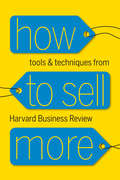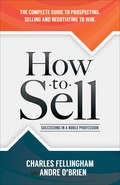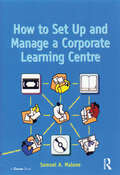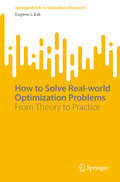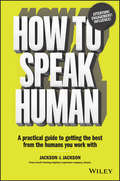- Table View
- List View
How to Sell Anything: What the Best Salespeople Know, Do, and Say
by Tom Bird Jeremy CassellBeat your sales target every time with the UK’s bestselling book on sales—How to Sell Anything (previously titled Brilliant Selling). Whether you are a novice salesperson just breaking into the industry or a tested veteran waiting to take the next step, these pages will show you how to instantly improve your performance and get you started on the path toward success you’ve always dreamed of and beyond.These sales professionals know what works and will arm you with all the trade secrets necessary to guarantee your continued success. Their pragmatic advice and dynamic sales tips will keep you one step ahead of the field, and most importantly, one step ahead of the customer.Find out how you can use your personality to perfect your sales technique and reach a deeper, more comprehensive understanding of customer needs. You will learn this secret and countless other strategies such as: Developing your personal “brand” Self-coaching Time management and the planning process Setting the right goals Foundations of effective influencing Asking the right questions Collaborative negotiation Prospecting with purpose Appeals to the customer and persuasive delivery Managing relationships
How to Sell Engineered Products
by Christean M. KappThis book is not a traditional book on sales. The focus is tactical as well as strategic. The book combines sales tactics and company strategy in a unique way and shows how they must complement each other for true success.
How to Sell More
by Harvard Business ReviewOver the last decade, technology has dramatically changed the role of salespeople at companies of all sizes. But one crucial fact remains: Sales is the most vital function of every business.In How to Sell More, the editors of Harvard Business Review have gathered advice from some of the world's top business professors, consultants, trainers, and sales managers. In these collected essays, you'll learn how to: Effectively recruit, train, manage, and support these key employees Use smart pricing, promotions, and incentives to make your sales team more successful Avoid the biggest mistakes entrepreneurs make when pursuing their first sales Master the daily challenges of selling, from planning a sales call to handling a potential customer's toughest questionsMore than most workers, salespeople perform in a field where success is easily measured: How much did you sell today, this week, this quarter? If you're looking for ways to bump up those numbers, this book offers you valuable insights and practical tools.HBR Singles provide brief yet potent business ideas, in digital form, for today's thinking professional.
How to Sell Out: The (Hidden) Cost of Being a Black Writer
by Chad SandersA timely, vulnerable, and cutting-edge exploration of the pressures and pitfalls of writing while Black in America in this urgently needed addition to the national conversation of race, money, and art.In the summer of 2020, when the nation was erupting in protest over the murder of George Floyd, Chad Sanders was quietly celebrating for selfish reasons. Why? After years of struggling to get his footing as a writer, he&’d finally landed a New York Times op-ed. He wrote an essay about the hollow messages of concern he&’d been receiving from white friends and colleagues. It went viral, and in the years that followed, he built a solid career as a creator—of books, podcasts, TV shows, and films—by mining his most painful experiences of being Black in America. Black pain for white money. For Sanders, this was a lucrative trade. One he thought he could work for the rest of his life. But it didn&’t take long for him to realize he, like so many other writers, was getting the short end of the stick. In How to Sell Out, Sanders draws on his personal experiences to offer a wry, darkly comic look at the invisible realities of making a living as a Black writer who writes about race. He relays stories of his time in the tech business, his experiences in TV writers&’ rooms, his childhood participation in Jack and Jill, his family and relationships, and the struggles of sharing his racial trauma in exchange for cash. Combining meditations on historical and current events and the intersection of race and class with short creative essays, Sanders sculpts a freewheeling arc that is as funny as it is moving and thought-provoking.
How to Sell Technical Services and Equipment
by James R. HuttonAuthor James R. Hutton shares his decades of experience in the petroleum industry to help readers master the challenge of industrial sales. In How to Sell Technical Services and Equipment, Hutton covers the many aspects involved in B2B sales, with product knowledge being the key to success. Hutton breaks down the process into separate chapters covering more than 60 different topics ranging from identifying the decision makers and gathering intelligence, to handling unpleasant customers and introducing new products. Sales professionals, sales manager, and senior executives in all industries will find the information found in this book to be invaluable. Key Features: • Learn how to respond to tough situations • Learn how to best manage time • Learn how to close the sale • Learn how to impress customers • Learn how to prospect for new business • Learn how to strike responsive chords • Learn how to send out the right signals so the right signals come back
How to Sell Your Art Online: Live a Successful Creative Life on Your Own Terms
by Cory HuffAn essential guide for artist that teaches them how to skip the gallery system, find their niche, and connect directly with collectors to profitably sell their art.For years, galleries have acted as gatekeeper separating artists and collectors. But with the explosion of the Internet, a new generation of savvy, independent artists is connecting with buyers and making a substantial living doing what they love.How to Sell Your Art Online shows any artist how to make a successful living from their work. Cory Huff dispels the myth of the starving artist and provides the effective business strategies necessary to make artistic creations pay. He helps individual artists find their niche; outlines the elements essential for an effective website; and provides invaluable advice on e-mail marketing, blogging, social media marketing, and paid advertising--explaining how to tie all these online activities into offline success.Most importantly, he shares the secret to overcoming the biggest challenge artists face when self-marketing: learning how to tell their unique stories. Every artist has a reason for making art, but can't always find the right way to express it. Huff provides exercises artists can use to clarify the intellectual and emotional process behind their art, and teaches them how turn that knowledge into stories they can tell online and in person--and expand their reach through blogs and social media to build their art business.Drawing from the stories of successful artists, thoroughly describing how art is sold today, and providing tips on how to build connections personally and electronically, How to Sell Your Art Online illustrates the countless ways artists can take control of their creative careers--and sell their work without selling out.
How to Sell Your Crafts Online: A Step-by-Step Guide to Successful Sales on Etsy and Beyond
by Derrick SuttonWith over 400,000 sellers on Etsy, how can you make YOUR shop stand out and increase your sales? This is a key question for many crafters and artists who are selling online these days. Now here are all the answers and much more from author and Etsy seller Derrick Sutton.Based on Sutton's self-published guide, and drawn from his practical experience, you will learn how to boost your Etsy sales, attract more customers, and expand your online presence. He shares his proven online sales and marketing knowledge in an easily accessible format, complete with simple actions steps at the end of each chapter. Learn how to completely optimize your Etsy shop, website, or blog, and much more.Some of the topics covered include:-How to design a catchy Etsy banner-How to gain an instant analysis of your shop and where you need to focus your efforts-A crash course on photographing your items and key mistakes to avoid class-Fail-safe copywriting secrets-How to take advantage of Etsy's forums, Treasury, and more-The effective way to use Facebook and Twitter, and why so many people get it wrongA perfect gift for entrepreneurial artists, How to Sell Your Crafts Online offers crafters practical internet marketing techniques from an experienced Etsy seller that will pave the way for a profitable online business!Praise for Derrick Sutton's e-Guide Crafting Success:"This is really a great guide through the mind-boggling thicket of internet selling. It's so easy to follow and straight forward…" --- Etsy seller jenniferwhitmer"I definitely saw a difference in my sales after doing many of the things suggested."--- Etsy seller mishmishmarket"A true wealth of useful information." --- Etsy seller helixelemental"[The steps are] easily presented, so making changes to your shop can be done instantly as you are reading." -- Licky Drake, HappyGoLicky Custom Silver Jewelry"A tremendous amount of information. I learned more from [this book] than from anything I have purchased in five years." --- Etsy seller HandpaintedGifts
How to Sell a House Fast in a Slow Real Estate Market
by William Bronchick Ray CooperIn a slow real estate market, selling your house can be difficult -- especially if you owe more on your mortgage than your house is worth. In times like these, it's not enough to simply list your home and wait; you actually have to sell your home. This practical, important book shows you how to use marketing techniques, advertising, repairs and upgrades, home staging, and other creative, effective tactics to get your house sold fast-- no matter how bad the market is.
How to Sell a House When It's Worth Less Than the Mortgage
by Dwan Bent-TwyfordDue to the wave of refinancing in recent years, and the fall in home values, in 2009 about 12 million homeowners and investors will be "underwater"--owing more than their property is worth. This book explains all the options for these homeowners who are trapped with houses they want to get free from, people whose property value has dropped so low that they can't sell the property, people whose mortgage payment has adjusted and now they can't afford the property. In addition to offering advice on subject to's, rentals, leases, loan modifications and more...the book will teach America how to short sale their own home.
How to Sell at Margins Higher Than Your Competitors
by Brooks William T. Steinmetz Lawrence L.Praise for How to Sell at Margins Higher Than Your Competitor "This is the complete book for both new and experienced salespeople and business owners to learn and re-learn the essentials for success. How to Sell at Margins Higher Than Your Competitors emphasizes the pricing strategies and tactics to increase the market share and profits of any organization. This is a book that is as important to presidents as it is to salespeople. " --Bill Scales, CEO, Scales Industrial Technologies, Inc. "As the largest service provider in our industry, we have a significant market advantage. However, we constantly walk the pricing tightrope because, as this book so clearly states, 'business is a game of margins . . . not a game of volume!'" --John K. Harris, CEO, JK Harris & Company, LLC "If you live and die on price, this book could be your only lifeline. " --Tom Reilly, CSP, author of Value-Added Selling and Crush Price Objections "How to Sell at Margins Higher Than Your Competitors successfully illustrates profitable sales truths to assist us in selling for maximum return. This book's well-researched, logical, and affirming words validate the simple fact that as a premium company we deserve premium margins. So, while our competitors reduce or match prices out of fear and scarcity, our managers, thanks to this powerful sales tool, can continue quoting and closing with profitable confidence. " --Joe Bracket, President, Power Equipment Company "I learned a long time ago that it is pretty difficult to control what my competitors will do, but we must control what we do--like maintaining margins. This book is a 'wow!' that will help my salesmen crack bad habits. Sales organizations should design their entire training programs around the content in this book. " --George C. Giessing, President, Brusco-Rich, Inc. "This energizing book is the 'right stuff' for every sales force. It should be a required study for every executive and sales professional who seeks to be successful. " --David R. Little, Chairman and CEO, DXP Enterprises, Inc.
How to Sell to Retail
by Clare RaynerAre you ready to take your business to the next level? If you've got a product to sell there's only so much growth you can sustain by selling directly to end users. The ultimate key to really developing your business into a bigger enterprise is to get it sold by retailers. But how do you convince a cautious retailer and give a great outward impression of your business, big or small? Working through a series of 5 logical sections broken down into 12 steps, How to Sell to Retail will teach you how to look big, plan big, pitch big, get big and stay big though successfully selling to retailers.
How to Sell: Recipes for Retail
by John HoernerWhether it's ideas or products, in our business or for someone else, we all need to be able to sell. This book guides us through invaluable tips from John Hoerner, who has over 50 years' experience as a retailer. Divided into chapters covering all aspects of retail, John’s wisdom is summarised in short incisive quotes, including: advice on handling customers, stores, buyers, suppliers, stock management, marketing and PR, strategy, investment and people. How To Sell is an authoritative guide to becoming the best retailer you can be.
How to Sell: Succeeding in a Noble Profession: The Complete Guide to Prospecting, Selling and Negotiating to Win
by Charles Fellingham Andre O'Brien"How to Sell: Succeeding in a Noble Profession" charts an effective path that professional trainers use to transfer skills that work from the training room to the marketplace. It includes twelve time-tested human relations principles that are essential for any business professional to expand their business and acquire more loyal customers. The principles are linked to consultative processes for selling, prospecting, negotiation and customer service. "How to Sell" is an easy to read guide applying the most successful selling behaviors that produce immediate sales results. Nothing happens until something is sold. This cliché was true yesterday, it&’s true today, and it will be true tomorrow. As sales professionals, the true success of our business rides on our shoulders. We are placed front and center with all eyes on us, and this position requires us to be smart, strong, creative, and true leaders within our organization. Charles Fellingham and Andre O&’Brien wrote this book for you. They realize how important it is for you to be wildly successful and they are confident that you will achieve much by living the principles they discuss and by following the processes they outline. They look forward to developing a strong and lasting relationship with you–and to make this possible, they have provided free tools to support your efforts, courtesy of their website shared in the book.
How to Set Up & Run a Fashion Label: Third Edition
by Toby MeadowsNo matter how talented you are as a designer, if you are going to run a successful fashion label you also need to know about business—from marketing and PR to manufacturing your collection, and where to find the money to finance it all. In How to Set Up and Run a Fashion Label 2nd edition, Toby Meadows presents a no-nonsense guide to running your own business, whether it is within the clothing, accessories, or footwear sectors. Packed with tips, case studies, and tasks to help you analyze yourself, your market, and your product, the book is designed for anyone wanting to start their own fashion business.This new, expanded edition contains information on e-commerce, sustainability, five new case studies, and updated images throughout.
How to Set Up & Run a Fashion Label: Third Edition
by Toby MeadowsNo matter how talented you are as a designer, if you are going to run a successful fashion label you also need to know about business – from marketing and PR to manufacturing your collection, and where to find the money to finance it all. In How to Set Up and Run a Fashion Label 2nd edition, Toby Meadows presents a no-nonsense guide to running your own business, whether it is within the clothing, accessories or footwear sectors. Packed with tips, case studies and tasks to help you analyse yourself, your market and your product, the book is designed for anyone wanting to start their own fashion business.This new, expanded edition contains information on e-commerce, sustainability, five new case studies and updated images throughout.
How to Set Up Information Systems: A Non-specialist's Guide to the Multiview Approach
by Simon Bell Trevor Wood-HarperThis introductory user's guide to systems analysis and systems design focuses on building sustainable information systems to meet tomorrow's needs. It shows how practitioners can apply multiple participatory perspectives in development, so as to avoid future problems. As a practical guide, it is presented to be readily comprehensible and is organized to enable users to concentrate on their goals efficiently, and with minimum theoretical elaboration. The chapters follow the sequence involved in planning an information system, explaining key words, the time involved in each step, ending with a tutorial or exercises.
How to Set Up and Manage a Corporate Learning Centre
by Samuel A. MaloneFew corporate initiatives of the last ten years have been more influential in the development of a learning culture at work than the corporate learning centre. The first edition of Sam Malone's book quickly established itself as the definitive concise guide to best practice. The second edition reflects the lessons learned since that time, along with the developments in learning technology. Setting up and sustaining a successful centre involves strategic skills such as planning and championing; technical skills, including budgeting, marketing and evaluation; and the people skills of communicating, influencing and managing change. There are chapters in the book for all the stakeholders involved, including the learners themselves. How to Set Up and Manage a Corporate Learning Centre offers definitive advice on all of these areas. Sam Malone demystifies what is a difficult, expensive and long term project for any organization.
How to Set up & Run a Fashion Label 2nd edition: Third Edition, Updated And Expanded
by Toby MeadowsNo matter how talented you are as a designer, if you are going to run a successful fashion label you also need to know about business—from marketing and PR to manufacturing your collection, and where to find the money to finance it all. In How to Set Up and Run a Fashion Label 2nd edition, Toby Meadows presents a no-nonsense guide to running your own business, whether it is within the clothing, accessories, or footwear sectors. Packed with tips, case studies, and tasks to help you analyze yourself, your market, and your product, the book is designed for anyone wanting to start their own fashion business.This new, expanded edition contains information on e-commerce, sustainability, five new case studies, and updated images throughout.
How to Set up & Run a Fashion Label 2nd edition: Third Edition, Updated And Expanded
by Toby MeadowsNo matter how talented you are as a designer, if you are going to run a successful fashion label you also need to know about business – from marketing and PR to manufacturing your collection, and where to find the money to finance it all. In How to Set Up and Run a Fashion Label 2nd edition, Toby Meadows presents a no-nonsense guide to running your own business, whether it is within the clothing, accessories or footwear sectors. Packed with tips, case studies and tasks to help you analyse yourself, your market and your product, the book is designed for anyone wanting to start their own fashion business.This new, expanded edition contains information on e-commerce, sustainability, five new case studies and updated images throughout.
How to Settle an Estate
by Plotnick Charles K.The most complete and up-to-date estate-planning guide available. . . Thoroughly revised and updated to reflect the latest tax codes, the third edition of How to Settle an Estate is the essential step-by-step guide to lead readers through the complex and daunting process of settling an estate. In clear and practical lay terms, authors Charles K. Plotnick, L. L. B. , and Stephan R. Leimberg, J. D. , both experts in estate planning, provide readers with invaluable advice, including:# How to raise cash for immediate estate expenses# Dealing with insurance claims# Knowing when to hire a lawyer, an accountant, and a stock broker# Managing real estate# Distributing assetsAnd much more. . .
How to Sharpen Your Business Writing Skills
by Nan LevinsonAn opportunity to update writing skills and excel in today’s e-writing environment. Packed with practical advice attuned to current business writing and presentation challenges, this book features special strategies to speed online research and guidelines for creating safe and savvy e-mail. Through interactive, self-directed exercises, you’ll acquire the techniques that professional writers use to research, draft, compose, and edit their work. Examples and checklists will keep you on track as you practice writing better letters, memos, proposals, reports, and e-mail (with its own rules and etiquette). If you struggle to find the words and tone appropriate for given situations, you‘ll appreciate the advice on selecting language that works. There's also plenty of help with those niggling questions about grammar and punctuation. This book will help make your writing more effective, polished, and direct. It will distinguish you and help you move ahead, whether you're an administrative assistant or company officer. This book will help you: • Identify your audience • Organize your material • Write clearly and effectively • Master the steps of editing and rewriting • Conduct online research thoroughly and quickly • Compose e-mail that communicates your message efficiently • Avoid common pitfalls of electronic communications • Use writing to eliminate misunderstandings
How to Shop for Free: Shopping Secrets for Smart Women Who Love to Get Something for Nothing
by Kathy SpencerFor fashionistas and carpool moms alike: a veteran super-shopperOCOs secrets for finding insider deals and working the coupons and promotions to get much of their shopping lists for free
How to Smell a Rat: The Five Signs of Financial Fraud (Fisher Investments Press Ser.)
by Lara Hoffmans Ken FisherThe money manager and New York Times–bestselling author explainshow to protect yourself from fraud: &“Fisher details the red flags that should alert investors.&”—Associated Press Whether it&’s small-scale or large, a pump-and-dump or a Ponzi scheme, financial fraud is nothing new. Where there&’s money, there are scammers—and it&’s up to you to understand their playbook and ask the right questions to avoid getting taken. With a decades-long career in the industry, the founder of the multibillion-dollar money management fund Fisher Investments offers a clear guide to detecting the warning signs. Filled with in-depth insights and practical advice, this reliable resource: Prepares you to identify and avoid financial scams that could instantly destroy your wealth Contains both recent and historic examples that highlight how financial frauds are committed Provides questions everyone should ask before entering any investment endeavor &“With five straightforward rules that would have saved any investor from Bernie Madoff, investment firm CEO and Forbes columnist Fisher gives readers a secure plan for fraud-proof investing, worthwhile for novices and sophisticated financiers alike…Much more than what to avoid, Fisher&’s concise guide should be highly illuminating and confidence-building for anyone with a bank account.&” —Publishers Weekly, starred review
How to Solve Real-world Optimization Problems: From Theory to Practice (SpringerBriefs in Operations Research)
by Eugene J. ZakWritten by an experienced operations research practitioner with a strong applied mathematics background, this book offers practical insights into how to approach optimization problems, how to develop intelligent and efficient mathematical models and algorithms, and how to implement and deliver software products to customers. With a focus on revealing the similarities and differences between academia and industry in mathematical modeling, the book provides useful tips and advice based on the author’s extensive experience as a principal developer working to solve real-world optimization problems for several major high-tech companies.The book offers valuable food for thought for researchers and practical guidance for graduate students preparing for their future projects in the industry. It is also an essential resource for practitioners working in the industrial, business, and service sectors.
How to Speak Human: A Practical Guide to Getting the Best from the Humans You Work With
by Jennifer Jackson Dougal Jackson'An instant classic—this book is so utterly relevant and needed. And it is hellishly refreshing to boot. I fucking love it, and heartily recommend it to all.' —Dr Jason Fox, best-selling author of How to Lead a Quest Take a practical approach to the communication challenges in your workplace. Through 11 strategies, 23 tactics and 15 stories this handy how-to will help curious humans: use the science of connection to create compelling communication translate mind-numbing complexity into captivating simplicity hijack attention, engage and influence others. Whether you're a leader looking to connect with your workforce; a member of a small team, hungry to make a difference; or at the helm of a global organisation, with an eye on the horizon – this is a how-to for forward thinkers like you.


